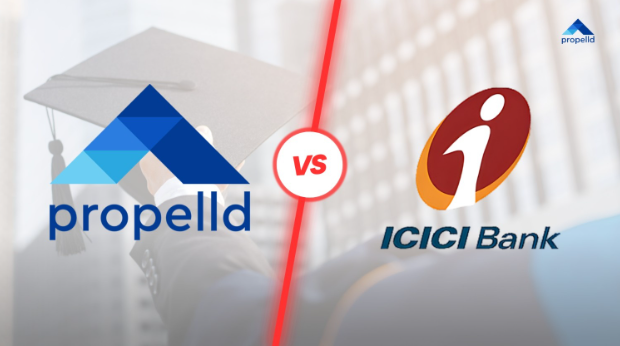Studying from home or on the go has become the new normal. Distance learning isn’t just about convenience anymore; it’s how millions of students are building their careers. But with course fees rising every year, one question keeps coming up: can you actually get an education loan for a distance learning course?
The good news is, yes, you can. And with an ever-increasing number of online learning customers, projected to reach 57 million by 2027, the right funding is essential.
In this guide, you will get to know who’s eligible, what documents you need, and how to apply, so you can focus on your studies without stressing over money.
What is Distance Learning?
Distance learning allows you to earn degrees, diplomas, or certifications without the need to attend classes physically. Whether you're a working professional or someone located far from educational institutions, distance learning provides a flexible way to study.
These programs can range from professional certifications to full-fledged degree courses in fields like business, engineering, and healthcare. It's a perfect option for those who need education on their own terms.
Get an Education Loan 10X Faster than Banks.
Distance Learning Education Loan Eligibility Requirements
To qualify for an education loan for distance learning, you need to meet specific eligibility criteria, which may vary slightly across lenders. The general requirements include:
- Admission proof of enrollment in an accredited distance learning program.
- A satisfactory academic record, like marksheets, with usually a minimum of 50-60% in previous studies.
- You must be an Indian citizen.
- Income proof, like a bank statement and evidence of your or your co-applicant's financial stability.
- The applicants must be at least 18 years old.
- Some lenders require a co-applicant to secure the loan, particularly for higher amounts.
Ensure that your course is recognised by UGC, AICTE, or other relevant bodies, as some lenders offer loans only for approved institutions.
How to Apply for a Distance Learning Loan?
Understanding the loan application process and meeting the criteria is essential. While requirements vary by lender, most banks prefer a CIBIL score of 700 or higher, especially for unsecured loans. Since many students lack a credit history, lenders often evaluate the credit score of the co-applicant, typically a parent or guardian.
Follow these steps to apply for an education loan for distance learning:
- Begin by comparing loan products, interest rates, and eligibility requirements from various lenders.
- Ensure you meet the loan criteria and that your course is eligible for funding.
- Collect all the necessary documents, including your admission letter and academic records such as marksheets or report cards.
- Submit your application online or at the bank branch, along with the required documents.
- The lender will process your application, which may include a credit check and verification of your documents.
- After approval, the loan amount will be disbursed directly to the institution or you, as per the terms.
By following these steps, you'll be well on your way to securing the funding you need for your education, ensuring a smooth financial journey ahead.
Minimal Docs, Maximum Approval - Apply Now.
Documents Required for Distance Learning Education Loan
When applying for the loan, you'll need to provide various documents to your lender. These documents are essential for verifying your identity, eligibility, and course details. Here's a breakdown of the typical documents required:
- Proof of acceptance, such as an admission letter, into a recognised distance learning program.
- Course details, including the duration and fee structure.
- Academic transcripts, like mark sheets or certificates from previous education (e.g., 12th grade or undergraduate).
- Identity proof, such as a passport, driver's license, or Aadhaar card.
- Proof of residence, like utility bills, bank statements, or rent agreements.
- Income proof, such as pay slips, income tax returns, or bank statements from you or your co-applicant.
- Bank statements, typically for the last 3-6 months.
Having these documents ready will simplify your application process and avoid delays.
Explore different Types of Education loans with Eligibility, Interest Rates, & Benefits to understand which option best suits your needs and repayment capacity.
Top Lenders for Distance Learning Loans
When it comes to financing distance learning programs, students can access loans from a mix of federal programs, private lenders, and Indian banks. The ideal lender depends on factors such as your citizenship, credit history, and the type of program.
Here are some popular lenders offering education loans for distance learning:
U.S. Federal and Private Lenders
Interest Rates on Distance Learning Education Loans
In India, both major banks and NBFCs offer education loans customised for distance learning programs. Public sector banks like the SBI offer education loans starting at 7.50% p.a., with special concessions for female students.
Private banks such as ICICI and HDFC provide loans with interest rates ranging from 10% to 14% p.a., depending on the course and institution. Here's a comparison of the interest rates from key lenders for distance learning education loans:
This comparison provides a clear understanding of the available options, allowing you to select the lender that best suits your financial needs and study goals.
Benefits and Challenges of Education Loans for Distance Learning
Education loans for distance learning offer flexible funding options for remote education, but they come with unique challenges, particularly in terms of eligibility and repayment. The loan application process can be more complex than that for traditional campus-based programs.
Let's look at some quick merits and demerits of it:
Benefits of Education Loans for Distance Learning:
- An education loan can save you from draining your savings for tuition and other expenses, leaving you prepared for unexpected costs.
- Interest on the loan is tax-deductible under Section 80E, providing additional financial relief.
- Compared to personal loans, education loans have lower interest rates, saving you money in the long term.
- Most education loans offer a moratorium period, where repayment begins after course completion or a grace period.
Challenges of Education Loans for Distance Learning:
- While loans provide initial financial relief, repayments can feel heavy, especially if you're still job hunting after graduation.
- Some lenders charge interest during the course, leading to a larger loan balance by graduation.
- Higher loan amounts often require collateral, which may not be feasible for everyone.
- Education loans often cover tuition fees, but expenses like living costs and study materials may need to be managed separately.
Explore Myths and Facts about Education Loans. Get the real insights before making your loan decisions.
Struggling with a Low Credit Score for an Education Loan? Here's What Students Are Asking!
A low credit score can make securing an education loan challenging, but it’s not impossible. Many students worry about their chances of getting a loan, especially when family financial conditions aren’t ideal. Understanding the loan application process and knowing what to focus on can increase your chances of approval.
Reddit User in r/Indian_Academia shared:
“I’ve cleared JEE Mains with a 94th percentile, but my father’s credit score is poor. I want to apply for a B.Tech loan from a private college, but I'm unsure if I’ll get approval. I don’t want to waste another year.”
Insight: While a poor credit score may raise concerns, lenders assess more than just credit scores. Factors like your academic performance, entrance exam results, and the reputation of the college also come into play.
If you have a co-applicant (like your father) with a lower credit score, it may affect the loan terms, but the loan can still be approved, especially if you can demonstrate a strong career trajectory post-graduation.
What do we infer from the above case?
Academic Performance: Your high score in JEE Mains can strengthen your application, showing that you're a committed and capable student.
Co-Applicant's Role: A weak credit score from a co-applicant may lead to higher interest rates, but it's still possible to get the loan, primarily if you can provide a solid justification for repayment potential.
Alternative Options: Private banks and NBFCs may be more flexible in their assessment, and there are education loan products specifically designed for students from middle-income families.
Tip: Be transparent with your lender about your family's financial situation. Highlight your academic achievements and your future earning potential.
Education loans for distance learning offer flexible funding options but require careful planning. By understanding loan terms, eligibility, and interest rates, you can choose the best lender for your needs. Make sure to assess repayment terms and ensure your loan aligns with your career goals. With the right approach, you can finance your distance education without the financial strain.
Don't let financial roadblocks slow down your global education dreams. With Propelld, you get quick digital approvals, study loans up to INR 50 lakhs, and zero collateral hassles. Plus, enjoy flexible repayment options designed to fit your journey. Propelld makes financing simple, so you can focus on achieving your goals.
Take the first step towards your future - Apply with Propelld today!











.svg)